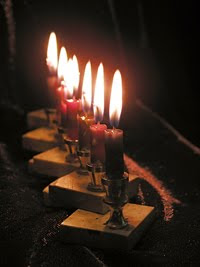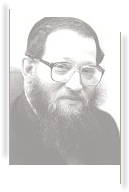 The centerpiece of Passover is, of course, the matzah. The Zohar refers to matzah as "the bread of faith." Presumably, this is because the Israelites left Egypt in such great haste that they could not take along any provisions, and took only the unleavened dough with them. With trust in God they headed into the barren desert where no food was available. The matzah, therefore, represents the Israelites' faith and trust in God.
The centerpiece of Passover is, of course, the matzah. The Zohar refers to matzah as "the bread of faith." Presumably, this is because the Israelites left Egypt in such great haste that they could not take along any provisions, and took only the unleavened dough with them. With trust in God they headed into the barren desert where no food was available. The matzah, therefore, represents the Israelites' faith and trust in God. Rabbi Zvi Elimelech of Dinov (Bnei Yissaschar) provides an additional insight. The prohibition of chametz on Passover is much harsher than that of other forbidden foods. For example, if a piece of non-kosher meat falls into a pot of kosher food, and the volume of the kosher food is at least 60 times that of the non-kosher meat, the food may be eaten. However, if a tiny crumb of chametz falls into a huge vat of food on Passover, even if the volume is infinitely great -- a million to one -- the entire vat of food is prohibited. The tiniest crumb of chametz cannot be considered negligible.
Bnei Yissaschar explains the difference between chametz and matzah. Matzah is never allowed to be left without someone working it. From the time the flour and water are combined, the dough is kneaded, promptly rolled out, perforated, and baked. Nothing happens to the matzah that is not the direct effect of someone handling it. Not so with chametz, where the ingredients are mixed and then set aside for a period of time to rise. The latter process is spontaneous, occurring without anyone's doing anything to make it rise.
Matzah and chametz, therefore, represent two perspectives. Chametz represents the idea that things can happen by themselves, while matzah symbolizes that nothing happens unless someone makes it happen. There is no spontaneity.
The Torah did not wish to deprive us of bread all year, but when we celebrate our independence and our free will, the matzah reminds us that there is no spontaneity in the world. Everything is at all times under the direct providence of God. Except for the choice in behavior, of moral and ethical acts that God assigned to man, there is not even the tiniest occurrence that is spontaneous. The Baal Shem Tov was very emphatic about this, saying that if someone digs into sand, each of the millions of grains of sand falls into the place where God wills it to be. Not even the placement of a grain of sand is without design.
Matzah, therefore, symbolizes that everything in the world, great and small, is under the direction of God. That is why the Zohar refers to matzah as "the bread of faith."
from Rabbi Abraham Twerki
http://www.torah.org/features/holydays/emotionalSlavery.html
Thanks again Lynda






























No comments:
Post a Comment